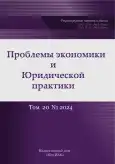Teleworking in the Data Economy for Generation Z: Analyzing the Opinions of High School Students
- Authors: Gumerova G.I.1, Shaimieva E.S.2
-
Affiliations:
- Financial University under the Government of the Russian Federation
- Kazan Innovation University named after V.G. Timiryasov (IEUP)
- Issue: Vol 20, No 1 (2024)
- Pages: 244-251
- Section: Management
- URL: https://bakhtiniada.ru/2541-8025/article/view/284337
- DOI: https://doi.org/10.33693/2541-8025-2024-20-1-244-251
- EDN: https://elibrary.ru/XXONMX
- ID: 284337
Cite item
Abstract
Representatives of generation Z—students of higher education—are active consumers of digital technologies in education and work.The purpose of the study, which is its subject: updating the state of development of teleworking in generation Z by recording responses in the questionnaire process. The object of the study: issues related to the use of teleworking implemented on the basis of information and communication technologies among young people-generation Z—students of higher education during the development of the data economy. Questions (tasks) of the work—a study of the following issues: the prevalence of teleworking among representatives of generation Z-students of higher education: the type of work attractive to respondents; the prevalence of teleworking among the respondents' environment; conditions conducive /hindering the involvement of respondents in the format of teleworking; the essence of « teleworking» for respondents.Research methods: analysis, synthesis, classification, comparative analysis, questionnaire. A survey of youth-generation Z—students of higher education (N=17) was conducted. The questionnaire consists of five parts, seventeen questions: «Characteristics of the student», «For those with and without teleworking experience», «For those with teleworking experience», «For those without teleworking experience», « Teleworking—this is...»The results of the study: the level of distribution of teleworking among generation Z has been confirmed (according to research by the All-Russian Centers for the Study of Public Opinion), research by Russian authors on the threats of teleworking of study and work; the development of the topic of «soft factors» among specialists of future periods. The prospects of teleworking research among generation Z in the form of volunteer activity are highlighted.
Full Text
##article.viewOnOriginalSite##About the authors
Guzel I. Gumerova
Financial University under the Government of the Russian Federation
Author for correspondence.
Email: GIGumerova@fa.ru
ORCID iD: 0000-0002-5198-7576
SPIN-code: 4426-5494
Scopus Author ID: 6506026980
ResearcherId: H-6985-2017
Dr. Sci. (Econ.), Professor, Professor of the Department of Management and Innovation
Russian Federation, MoscowElmira Sh. Shaimieva
Kazan Innovation University named after V.G. Timiryasov (IEUP)
Email: shaimieva@ieml.ru
ORCID iD: 0000-0002-9588-0199
SPIN-code: 5592-5270
Scopus Author ID: 56644835900
ResearcherId: P-7565-2015
Dr. Sci. (Econ.), Associate Professor; Professor of the Department of Management, Head of the Research Laboratory of Knowledge Management of the Faculty of Management and Engineering Business
Russian Federation, KazanReferences
- Bochkareva T. N. Undergraduates in the context of digital education // Bulletin of Pedagogical Sciences. 2021. No. 7. pp. 91–97.
- Bychkova D.A. Remote work in the modern realities of the Russian labor market // Actual aspects of the development of science and society in the era of digital transformation: Collection of materials of the XI International Scientific and Practical Conference, Moscow, November 06, 2023. Moscow: ALEF Publishing House LLC, 2023. pp. 149–153. doi: 10.34755/IROK.2023.72.57.180.
- Vagaeva O.A., Galimullina N.M. Formation of «soft skills» as a factor of competitiveness of future specialists // CITISE. 2023. No. 2. P. 345–357. DOI: http://doi.org/10.15350/2409-7616.2023.2.30
- Gumerova G.I., Shaimieva E.S. The concept of enterprise virtualization: theoretical and practical aspects in the fields of virtualization, teleworking, management of a virtual organization (Part 3) // Investments in Russia. —2019. No. 2(289). pp. 27–34.
- Gugueva D. A. Stavropol : Publishing house «AGRUS», 2019. 144 p.
- Drobysheva T.V., Kasyanov V.M. Psychological readiness of freelancers for entrepreneurial activity: an approach to the research problem// Institute of Psychology of the Russian Academy of Sciences. Organizational psychology and labor psychology. 2023. Vol. 8, No. 2. pp. 32–54. doi: 10.38098/ipran.opwp_2023_27_2_002.
- Drobysheva T. V., Voitenk M.Y. Drobysheva M.M. The image of her generation in the representations of different groups of Russians (on the example of the generations of «Baby boomers», «X» and «Millennium») // Scientific notes. Electronic scientific journal of Kursk State University. 2019. No. 3(51). pp. 220–230.
- Karpova G.G., Ubogovaya A.S., Fedoseeva A.A. Social insecurity of freelancers: objective position and subjective perception // Interaction. Interview. Interpretation. 2019. Vol. 11, No. 19. pp. 62–80. doi: 10.19181/inter.2019.19.4.
- Kozhevnikov O. A., Chudinovskikh M.V. Regulation of the work of remote workers in Russia and abroad // Bulletin of St. Petersburg University. Right. 2020. Vol. 11, No. 3. pp. 563–583.doi: 10.21638/spbu14.2020.303.
- Mukhametzyanova, F. G., Stepanova K.I. Reflections on new generations of students and features of the alpha generation in global education // Global Economics and Education. 2021. Vol. 1, No. 2. pp. 42–50.
- Is Generation Z the right generation? // Accreditation in education. —2017. No. 8(100). pp. 80 84.
- Skavitin, A.V. Teleworking in global economic practice Management in Russia and abroad. 2004. No. 6. pp. 108–117.
- Simonova A. A., Piti V.V. Remote work in the modern realities of the Russian labor market: an analysis of the opinions of young highly qualified specialists // World of Economics and Management. 2022. Vol. 22, No. 2. pp. 142–151. doi: 10.25205/2542-0429-2022-22-2-142-151.
- Strebkov D. O., Shevchuk A.V. The trap of flexible employment: how a non-standard work schedule affects the work-life balance of freelancers // Monitoring public opinion: Economic and social changes. 2019. No. 3(151). pp. 86–102. doi: 10.14515/monitoring.2019.3.06.
- Chvanova M. S., Anuryeva M.S., Kiseleva M.S. New forms of socialization of student youth in the Internet space // Bulletin of the Tambov University. Series: Humanities. 2017. Vol. 22, No. 6(170). pp. 32–40. doi: 10.20310/1810-0201-2017-22-6(170)-32-40.
Supplementary files








